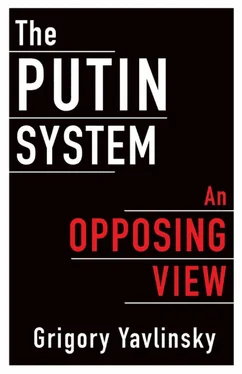On top of that, the aughts were also characterized by the development and strengthening of pervasive corporatism in Russia’s political system, which makes authoritarian rule significantly more potent, more rigid, and irreversible in terms of demodernizing the country. This corporatism is represented by the Eurasianist-style vertical hierarchy of power, ideologically inherited from the Stalinist model. Within this framework, the supreme government authority is perceived as the “director” of the entire country, in charge of everything, with all others being his employees “in the line of duty,” and every entity, all the way to one’s home or office desk, is a department or a subdivision of his megacorporation.
In this setting, which is rather unusual even for authoritarian regimes, society as a factor in political life gets completely erased from the map. Quite frequently, sociologists are noticing seemingly paradoxical responses of the mass consciousness to certain stimuli, sometimes in trivial, everyday situations, and these responses suggest, first and foremost, that public consciousness has morphed into the mentality of corporate servants who are fearful of the possibility of getting “fired” by their boss and thus of losing everything that remains of their well-being. Thus, in this regard, too, we are witnessing the consolidation of a political system in Russia that is quite accurately described as peripheral authoritarianism.
THE WEAKNESS OF INSTITUTIONS
Finally, analysts and observers have not paid due attention to the weakness of institutions, which is yet another feature of Russia’s peripheral authoritarianism. Strictly speaking, the issue of whether institutions are weak or strong does not have any fixed relationship to the choice of a political system, such as the choice between an authoritarian and a competition-based system, though it is quite possible that there is some correlation between the two. Overall, under any political system, whether an autocracy or genuine multiparty parliamentary rule, weakness in a society’s institutions diminishes the capacity of those institutions to manage societal developments. The opposite is also true: in instances where any of these political systems serve well, or relatively well, the interests of national development, they provide for the establishment of robust institutions that will ensure the continuity of the policies of the dominant class and their independence from the personal whims and prejudices of individual members of the ruling circle.
Certainly, authoritarian systems generally tend to produce regimes that are centered upon the personality of an unchallenged leader standing atop the ruling circle, embodying the regime, and playing the most important role in the process of making key decisions. Nevertheless, such a leader cannot and, in practice, never does substitute for the complex machinery of a modern state, let alone supplant the functioning of multiple institutions, without which it is impossible to conduct any sophisticated, productive economic activities, develop a modern social and business infrastructure, or even maintain basic order in any relatively advanced society. From this point of view, the task of constructing workable and efficient institutions is relevant for any government that has a sense of responsibility for its actions—and this includes leader-oriented dictatorships, as long as at least one of their goals is to secure steady development for their society and country.
Moreover, only the establishment of viable institutions can ensure an unperturbed succession, without catastrophes and upheavals, at the point when, for whatever reason, the individual resource of the man at the top has been used up. Leader-oriented regimes are bound to expire, at least for biological reasons, if nothing else, and in the absence of such institutions, it is highly likely that the end of these regimes will create a void at the top of the power hierarchy, followed by a no-holds-barred fight for control of the levers of power, a drastic increase in uncertainty, and deterioration of the business environment. Under the worst scenario, it may lead to chaos and a breakdown in state governance for a very extensive period of time.
It is plain to see that autocracies of a modernizing type, even markedly leader-oriented, personality-driven regimes (such as existed, for example, in South Korea), have managed to create and develop the social, political, and economic institutions that were generally capable of meeting the challenges of their time. These institutions were able to secure the basic continuity of policies during times of leadership succession at the top and to provide for the increasing complexity and modernization of their economy and society. Essentially, this and only this can serve as the precondition for a transition, over the long haul, from an authoritarian to a competition-based type of political system featuring alternation of ruling groups in power, elections as the tool to adjudicate the outcomes of competition among the teams contending for power, and, at the same time, strict, collectively set limitations on the range of potential activities in which the competing teams and the political forces behind these teams may engage.
Meanwhile, an authoritarian regime of a peripheral type—the kind that tends to produce stagnation and dependence upon the core of the world economy—is characterized by its typical inability to build viable, let alone successfully functioning, institutions. Not only is it bound to inevitably descend into one-man rule centered upon the cult of the leader, but also it has to switch the mode of governance to “manual,” practicing micromanagement from the top. That is, the institutional mechanisms and processes that automatically regulate economic, social, and political developments according to preestablished scripts either do not function without continuous intervention from the higher-ups or keep changing their modes of operation according to signals received from the supreme ruler, who has a virtually unlimited freedom of managerial decision-making.
Furthermore, such a regime of “manual” governance from the top traps the system in a situation where, once micromanagement is applied, it becomes impossible to go back to normal government functioning. From this point, continuous intervention is required just to keep government operating on a regular basis, since any deviations from standard operations are no longer automatically adjusted by the institutions operating on their own. Instead, fixing these deviations now requires special decisions to be made, as a rule, with the participation of the autocrat himself. As a result, the system becomes increasingly more dependent upon the accuracy and the effectiveness of decisions made at the top of the pyramid. At the same time, the likelihood of flawed or suboptimal decisions by the autocrat naturally increases, if only because of the inevitable exhaustion of his physical, psychological, and intellectual resources.
This is essentially what has been happening in Russia throughout the post-Soviet period. From the beginning, the process of developing legislative institutions took an extremely regrettable turn. The unsuccessful experience of the first post-Soviet legislative bodies—the Congress of People’s Deputies and its Supreme Council—could still be explained by the disconnect between the institutions formed during the Soviet period and their changed environment. However, the new legislative body that was established on the basis of the new constitution of 1993—Russia’s Federal Assembly—was subjected to constant negativity from the media and the government. The only plausible explanation for this negativity was the inability of the Kremlin—whose character and structure, already in the 1990s, was undoubtedly authoritarian—to develop working relations with this institution, which did not fit into the developing framework of authoritarian governance.
Читать дальше












